Definitive diagnosis of trauma injuries and chronic foot conditions is often the starting point to a successful recovery. We offer access to urgent MRI scans, surgery and non-invasive treatments within a private hospital setting. Using the latest techniques, including arthroscopic surgery, we aim to minimise the time before you are back on your feet and pain free.

Yorkshire cure for painful condition Morton’s Neuroma caused by high heels
It’s a condition that’s becoming increasingly common in middle aged women and also with runners. However, it can affect anyone from any walk of life. Morton’s neuroma is a painful ailment of the foot which is often linked to wearing high-heeled or tight-fitting shoes or with sports that put pressure on the feet. The pain is often so debilitating that patients are unable to walk more than a few steps and it affects every aspect of daily life. The number of people affected by this condition has more than doubled in the last ten years and women are eight to ten times more likely than men to suffer it – the largest group of those affected being women aged between 40 and 69 1. It can be treated effectively however in some cases, the exact cause is not known. Famous sufferers include Aerosmith frontman Steven Tyler, retired tennis star Lindsay ...
Read More
Read More

Bunion surgery – I feel that Mr Harris has ‘performed a miracle’
Julie, a medical receptionist from Alwoodley, Leeds suffered from prominent and painful bunions. To add to the misery, she also had bunionettes – a bump that develops on the outside of the foot near the base of the little toe. “It felt like I was walking on a pebble,” said Julie. Bunions can be hereditary. “Both my mum and grandma had bunions and neither of them had surgery to correct it. My grandma could barely walk and my mum could only walk wearing surgical shoes. I didn’t want to end up that way,” said Julie, 56, a former medical representative. Julie didn’t wear skyscraper heels, ...
Read More
Read More
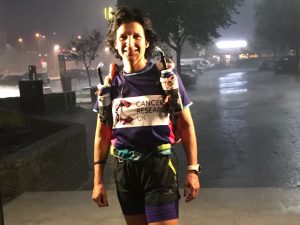
Otley Granny On Course to Run the World!
Most people look forward to their summer break as a time for rest and relaxation. Tish Joyce, a businesswoman and granny from Otley has other ideas that don’t involve laying by a pool and soaking up the sun’s rays. To celebrate her 50th year, Tish will complete the first stage of her incredible dream to ‘Run the World’. This year Tish will run Europe, her toughest challenge yet to complete a solo run across Europe completing a total of 2,000 kilometres across seven countries. On July 19 she will fly to Hanover and travel on to Bad Salzuflen. The following day will mark the start of ‘the most amazing run of her life’ which will take her six weeks to complete ...
Read More
Read More
Common foot conditions we treat
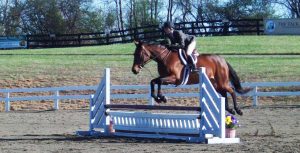
Lisfranc Injury
Jacques Lisfranc de St Martin was a surgeon in Napoleon's Army and first described the lisfranc injury in 1813. A common mechanism then was falling from a horse whilst trapping their foot in the stirrup. This resulted in a fracture at the base of the second metatarsal and separation of ...
Read More
Read More
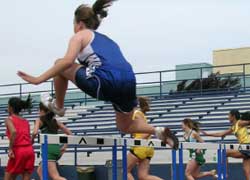
Navicular Stress Fracture
Navicular stress fractures are most common in middle distance runners(see press). They usually present with vague midfoot pain during or after exercise. Early diagnosis with MRI and CT allows early treatment and immobilisation. Patients often however present late with well established fractures. These usually require screw fixation ...
Read More
Read More
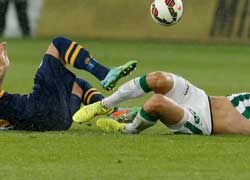
Metatarsal Fracture
5th metatarsal stress fractures are most commonly seen in good amateur and professional athletes. They usually present with vague lateral foot pain during or after exercise. Sometimes they can present with sudden severe pain when running and suddenly changing direction for example without any direct trauma to the foot. Early ...
Read More
Read More
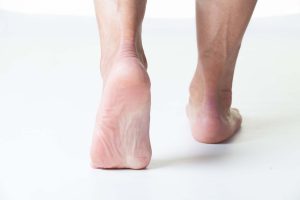
Osteochondritis of the Talus
Osteochondritis is a painful disease of the joint where the cartilage or bone in a joint is inflamed. It is a condition that can affect many of the bones and joints of the foot. Osteochondritis of the talus affects the supero-Iateral and supero-medial corners of the talus. It usually presents ...
Read More
Read More
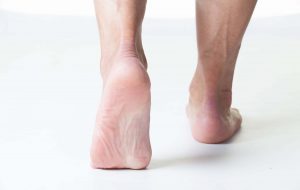
Posterior Tibial Tendon
The posterior tibial tendon adducts and supinates the forefoot and inverts the sub-talar joint. Dysfunction of the tendon can be classified into three stages. Stage 1 represents tendonitis. Treatment initially consists of a short period of immobilisation followed by physiotherapy and orthotics. If symptoms persist despite this approach then the ...
Read More
Read More
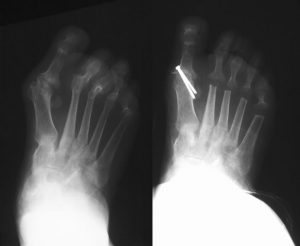
Rheumatoid Foot
The rheumatoid foot is a whole subject in itself. Ninety per cent of patients with rheumatoid arthritis will have involvement of their feet. This usually affects the metatarso-phalangeal joints of both feet symmetrically. Patients develop hallux valgus deformities with gradual subluxation and dislocation of the lesser toe MTP joints. The ...
Read More
Read More

High Arch – Pes Cavus
Excessively high arches can be neuromuscular in origin which causes an imbalance between two pairs of muscles or structural in origin following trauma or underlying deformity. Pes Cavus is used to describe an excessively high medial longitudinal arch. The cavus deformity of the mid foot is often associated with a ...
Read More
Read More

Flat Feet – Pes Planus
Pes planus is a term used to describe flattening of the medial longitudinal arch. In the child pes planus can be broadly divided into 2 groups - physiological and non-physiological. All infants have flat feet and in the majority an arch will develop by the age of 6 years. If ...
Read More
Read More
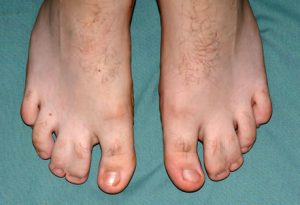
Syndactyly
Syndactyly can be divided into two types zygosyndactyly and polysyndactyly. Zygosyndactyly consists of complete or incomplete webbing between the toes usually the second or third. It is rarely symptomatic and rarely requires treatment. In polysyndactyly there is often duplication of the fifth toe with webbing between it and the original ...
Read More
Read More
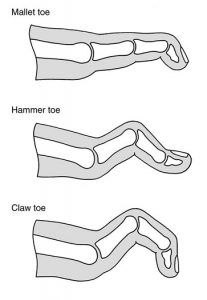
Toe Deformities – Mallet, Hammer, Claw and Overlapping 5th Toe
A mallet toe is a flexion deformity of the distal inter phalangeal joint of a toe. The deformity can be fixed or mobile. In the first instance consideration should be given to conservative treatment with padding, taping and orthotics. In the mobile deformity if conservative measures have failed then a ...
Read More
Read More